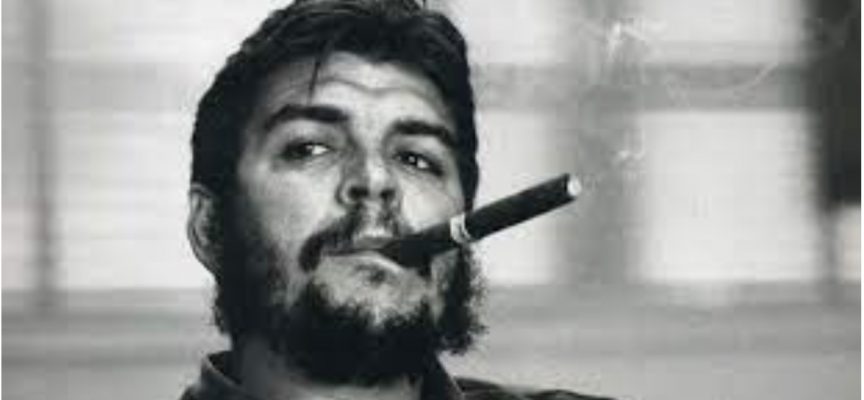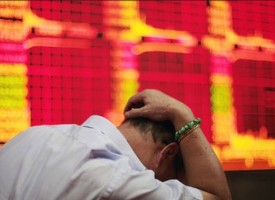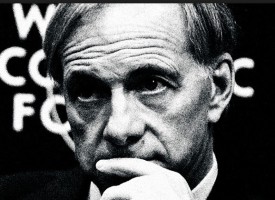Here is a fascinating piece titled Marx, “Che” Guevara and My Father.
This is a translation into English from the original Spanish article “Marx, el ‘Che’ y mi padre’, written by renowned Mexican economist and lawyer Luis Pazos, founder of ‘CISLE’ (www.cisle.org.mx), in July 2021. Translation by Hugo Salinas Price
Marx, “Che” Guevara and My Father
September 9 (King World News) – Luis Pazos: When I used to return from school – I was then in Sixth Grade of primary school – I loved to talk with a neighbor, a labor leader on the docks of Veracruz harbor. It was customary, back then, that people would pull out their chairs on to the sidewalk, to refresh themselves, and there we would chat. This labor leader, who lived in a wooden house, was a good-faith Socialist. His honesty was well-known.
I was interested in his ideas; he thought that workers in the USSR lived better and that Socialism was the solution for poverty. Since those early days, it worried me that while some would not have the means to eat, others would live in mansions, own several cars and enjoy luxuries. The area in which he lived was “Middle Class”, and around the corner from my home there lived Andrés Manuel López Obrador, who is now President of Mexico, and he used to come to my home to play.
I had doubts regarding the operation of Marxism in the real world. When I married, at 26, my wife and I went on a honeymoon to the USSR and to the nations of Eastern Europe to know about Socialism in reality. What I saw convinced me that Socialism did not reduce poverty, nor did the workers run the government, but rather that a reduced group of “small bourgeoisie” concentrated the economy in their hands.
The workers went on being workers, and the members of the Communist Party, who believed in Marxist Socialism, created a monopolistic State capitalism or real Socialism, where the capitalists are the high officials of the government.
In the 74 years of the operation of real Socialism in Russia, from 1917 to 1991, there was no increase in the standard of living for the majority of the workers, and their freedoms were less than those they enjoyed in the times of the Czars…
Billionaire Eric Sprott bought a 20% stake in a mining company
to find out which one click here or on the image below

Based on Marxist theories, Lenin created the so-called dictatorship of the proletariat, whose legitimacy was theoretically based upon “the people”. The difference with the dictatorships of the “Louis” of France, was that these dictatorships or absolutisms were justified by saying that they came, theoretically, from “the people”. The difference between the dictatorships of the “Louis” of France and these other dictatorships or absolutisms, was that the Kings of France justified their rule, alleging that their power came from God.
THE REAL MARX
Marx, according to his social division between bourgeois and proletarians, belonged to the bourgeoisie, he came from a well-to-do family and married an aristocratic woman of the nobility.
Marx never worked under the orders of a boss, nor was he a salaried worker. A Marxist principle states that the mentality of the workers is essentially different from the mentality of the capitalists or owners of the means of production. On the basis of this theory, Marx was unable to comprehend what the workers wanted, for he was a “Bourgeois”, not a proletarian. Marx never set foot in a factory nor did he ever hold a job.
Most of those who follow Marx do not know about the stages in his life. This essay does not intend to present his biography; it only intends to reveal aspects of his life which contradict what he preached.
Marx was extremely intelligent, but he had severe life-problems. He was part of a middle-class family with high income. His father, who was a lawyer, paid for his studies in the best universities of Europe, and later on he lived at the expense of his friend Engels.
In December, 2018, the Spanish daily “ABC” published an article with the title: “The very un-Communist life of Karl Marx: servants, debts, splurging of money on alcohol and whores”:
“The behavior of the thinker that decried oppression and defended the most vulnerable working classes was quite incoherent with the ideas he developed”.
“He was expelled from the University of Bonn for “nightly disorder in the street and drunkenness…and was accused of bearing forbidden firearms”.”
“He married a baroness and spent her dowry, which his mother-in-law provided, on drunkenness and prostitutes.”
In another article, with the title “Did you know that Marx lived off the money of others, that he published works not his own, and that he had no respect for workers?” Published by the PanAm Post of December, 2017, and reprinted by the Cato Institute, its author Hana Fischer says: Marx “…exploited very easily, the envy that lies in many hearts”.
In his book, “Socialism”, Von Mises points out: “Marx…rationalized resentment and the desire for revenge, in an orderly vision of universal history…there are always benefits to be had, in stirring up wickedness in men’s hearts.”
Paul Johnson in his book “Intellectuals” – published in 2008 – mentions that Marx “was a sponger; he never made the least effort to visit a factory or understand a productive system.”
Johnson presents him as a plagiarist. Among his thefts, Marx presents as his words: “The proletarians have nothing to lose but their chains”, a phrase by Marat; “Religion is the opium of the people”, by Heine; “Workers of the World, Unite”, by Karl Shapper, and by Louis Blanc: “From each according to his capacity, to each according to his needs”.
Johnson states that Marx published as his own work, several works of his friend Engels, who supported him during most of his life.
Marx was the boss of only one worker, his maid; he never paid her a penny and got her pregnant.
The money that his mother-in-law gave him – the mother of the aristocratic baroness whom he married – he spent on booze and brothels.
His father scolded Marx in a letter, where he complained that he “spent more money than young millionaires.”…
To find out which silver company made a major acquisition that will
quadruple their production click here or on the image below

We tally-up these negative facts regarding the life of Marx, because of their influence on what some call the destructive power of Marxist dialectic. Applying Marxist theories did not build, it destroyed wealth by concentrating it among governments, with no distribution among the workers.
In his stormy life Marx destroyed the capital inherited from his parents and received from his wife; his theories destroyed the inherited wealth of many and concentrated what little was left over, among the governing class.
In no country run on the basis of Marxist theories have the workers enjoyed rising incomes.
In the 20th Century, most emigrating workers have come from Socialist, Marxist countries, and they have ended up in the capitalist countries – which according to the Marxists, is where the workers are exploited.
From Socialist Germany, some 4 million Germans emigrated to Capitalist Germany (Wikipedia)
According to the UNO – United Nations Organization – as of 2019 some 1.6 million Cubans had left Cuba, a Socialist country – 14.6% of its population. About 80% of these emigrants went to the USA, a Capitalist country.
As of November 2020, the UNO calculates that 5.4 million Venezuelans have left Socialist Venezuela – approximately 19% of its population.
The country that received the most immigrants in 2019 was the USA, Capitalist, followed by Germany, Capitalist, at 13.1 million immigrants, according to the UNO, the OIM, and datosmacro.com.
Can those who favor Marxist policies provide any logical, sustainable argument to explain the fact of emigration from Socialist countries to Capitalist countries, which makes it quite clear that Socialism cannot create well-being?
FUNDAMENTAL PRINCIPLES OF MARXISM
Materialism. Only Matter exists. All religions are a sham, nor does any spirit animate the human being.
Dialectic: thesis, antithesis and synthesis – everything is constantly in a state of change, but this change will be halted when the workers come to power.
Class struggle: this is the motor of History.
The Value of Labor: workers create all wealth; the Capitalist expropriates the added value, created exclusively by the worker.
Historic Determinism: we shall inevitably arrive at the triumph of Socialism, the disappearance of private property and of Capitalism.
According to Marx, the progressive impoverishment of the workers in the Capitalist countries will generate a revolution which will take them to power.
In High School I began to read “Capital”, the principal work by Karl Marx; it was full of confusion and lengthy; I did not read it all, only the most important parts. There are very few, if any, Marxists who have read the whole of “Capital”. Years later, after having finished my studies up to Doctorate level, and devoting myself to research and teaching, I wrote a little book with the title of “Basic Marxism”, in which I explain the principal theories of Marxism, its methodological errors and its real results where it has been applied. Whoever is interested in Marxist theories, can download and read this little book at no cost, at cisle.org.mx
“CHE” GUEVARA, HERO OR VILLAIN?
At the time of the student riots of 1968, a friend told me that a group of riot-promoters had come to the Feminine University, where she was studying, and invited the girls to participate in a “March” against “student repression”.
She had participated in the March, and she was given a board with a photo of “Che” Guevara, which she carried during the whole march. I asked her if she knew who “Che” was; she answered that she did not know, but – she told me – “he looked handsome”.
In the “gay pride” marches, organized by homosexuals and lesbians, with whom I have no quarrel, I saw photographs of participants with T-Shirts with portraits of “Che”, and surely those using the T-Shirts were unaware of the fact that “Che” hated homosexuals, and that he sent several of them to concentration camps which he created in Cuba.
It is paradoxical that “Che” who fought Capitalism, became famous thanks to Capitalist marketing technique, with his photograph printed on T-Shirts.
In Mexico, not long ago, a group of Leftists inaugurated a sculpture of “Che”, and they have him as a model to be followed. In several biographies he is considered a hero, in others as a serial killer, and as a psychopath – i.e. “one who takes pleasure in killing.”
He was originally Argentinian and nationalized as Cuban; “Che” came from a family of upper middle-class; he was never poor, nor was he ever a salaried worker.
Guevara did not hide many of executions that he ordered, nor the executions which he carried out personally.
In 1959, hundreds of men were imprisoned in the “La Cabaña” jail, simply because they had been part of the fallen Batista government, and hundreds were shot. “Che” was in charge of that jail. On a TV program, “Che” said: “All executions are carried out under my express orders.”
Years ago, I spoke with a Cuban who had been jailed at “La Cabaña”. He told me that at a given moment, prisoners were taken to the office of “Che”, where some of his workers would read the names of the prisoners to “Che”, and he pronounced sentence: back to his cell, set him free, or shoot him. When my friend had been called and was waiting for the arrival of “Che”, my friend told me: “I literally shit in my pants, I was so frightened”. He was returned to his cell; some time later, he was released from the jail and with others, built a raft on which they left Cuba.
“Che” spoke at the United Nations Organization in New York, in 1954, and uttered the famous phrase: “We have shot, were are shooting and we shall continue to shoot.”
In the period between 1957 and 1960, there were 1,118 documented executions following orders by “Che” Guevara. According to the newspaper reporter Luis Ortega, the total number of “Che’s” victims amounts to 1,897. “Che” used to say that the achievement of Socialism justifies violence.
It was during his time in the “Sierra Maestra” of Cuba, that he discovered his passion for murder. In a letter to his father, where he mentions his first murder, he says: “I must confess to you, Father, that it was then that I discovered that I like to kill.”
The article by Álvaro Vargas Llosa, “Che Guevara, the killing machine” (30/7/2005) makes interesting reading.
*******
“In order to send men to the firing squad, there is no need for any judicial proof. That procedure is an archaic bourgeois detail. This is a revolution! And a revolutionary must be a cold killing machine motivated by pure hatred”.
José Pardo quotes “Che” Guevara, in “Fidel and “Che””
Libertad digital, 9/0/2017.
*******
In the letters and memoirs of “Che” Guevara, we find quotes that confirm his racism: “The blacks – those magnificent exemplars of the African race – have maintained their racial purity thanks to the little use they have for bathing.” (The quote is from “Che Guevara, The Cold Killing Machine” who hated blacks and homosexuals, by Daniel Rodríguez Herrera, Libertad Digital, 9/10/2017).
“Che” loved action, he did not care to be behind a desk or a job such as Director of the Central Bank of Cuba, or head of Ministry of Economics. He asked for Castro’s permission to go to the Congo with a group of Cuban soldiers, to help the rebels in expelling the Belgians from their territory; Cubans died, nothing was achieved and “Che” returned with empty hands.
The deranged, pathological radicalism of “Che” is perceptible in this thought: “I have no house, no wife, no sons, no parents, no brothers. My friends are my friends, as long as their political thoughts are like mine.”
His extremism led him to criticize the Soviet Union publicly, when it was with the Soviet Union’s assistance that the Cuban economy survived. Castro reprimanded him and then began the “parting of ways” between them.
A short time later, “Che” told Castro that he wanted to continue the liberation of Latin America from Capitalism, and wanted to begin with the poorest country: Bolivia. He entered the country secretly with a group of Cubans and with the support of some radical Leftists in Bolivia.
“Che” thought that he would move masses of exploited poor people to support his program of political liberation. This did not happen: far from giving “Che” support, the people of the countryside – the poorest in Latin America – informed the Bolivian Army of his whereabouts, until “Che” was finally surrounded and trapped after a brief skirmish.
“Che” was hurt, and he got the same treatment that he had handed out to hundreds of those he considered as his enemies – he was executed. And so was fulfilled what Jesus said to one of his followers, Peter, who had sliced-off an ear of the slave of the High Priest, who had been among those who had come to stop him: “Put away your sword, for he that kills by the sword shall die by the sword.” (Matthew, Chapter 26, verses 51 and 52.)
The best description of “Che” I found in the book “Handbook for the Contemporary Citizen” written by the wise philosopher and anthropologist, Ikram Antaki: “Our hero was “Che” Guevara. Thirty years later he is still a hero. Who would be brave enough to say that this Angel of Death strewed his path with dead bodies? He studied medicine, but he was never a doctor; he married several times, but was never a husband; he had several children and he was not a father; he moved through countries but was never a citizen. He was a little white chief of the Congo blacks, and of the Indians of Bolivia. Like in the films about cowboys”.
I ask myself: “What inheritance did the life of “Che” leave for young people? An example of a life to be lived, or to be avoided?
MY FATHER – WAS HE EXPLOITED, OR WAS HE AN EXPLOITER?
I was in pre-school in a government-run public kindergarten, named “Benito Juárez”; there, we referred to our teacher as “Profesora”, not “Miss”, and we did not learn English there. It was located a few blocks from my home. I remember that there was a big room with a piano, and every day all the children were given breakfast, because our Headmistress said that a child cannot learn if he arrives without having eaten. The kindergarten was scrupulously clean and well painted.
Years later I passed by the kindergarten with my mother – my father had already passed away – and I said to her that I recalled how clean the kindergarten was and that we had breakfast there. My mother told me: “Your father paid for those breakfasts and had the kindergarten painted, over the course of many years”.
I began to understand a side of my father’s nature that I had ignored as a child and as an adolescent.
My father, the son of Spanish immigrants, with some Arab blood, was born in Mexico. He began to work at an early age, and was a wage-earner for many years: later on, he became independent and began to expand as a businessman.
I lived in a reality that contradicted that which was preached by the Marxist theses. According to those theories, my father was exploited when he was a worker who depended on a boss, and when he became independent, he created a business and gave employment to several workers, and thus he became an exploiter.
A prestigious professor at the “Universidad Iberoamericana”, Doctor of Philosophy Miguel Mansur Kuri, told me that a student asked him to review his Thesis. The theme was “On the Capitalist Exploitation of Labor”. His thesis would be based on a poll of workers, to ask them about their exploitation by their employers. Months passed and the young man had not returned to see the person assigned to review his thesis. Finally, he showed up and Dr. Mansur said to me: “I asked the student about his thesis – what happened to the poll you were going to set up? And the student replied to me, ‘I’m going to change the subject, because more than 80% of the workers replied to the poll, that they were thankful and happy with their employer.’ “
My father had happy memories regarding the men who had been his bosses, and most of his workers had a kind regard for him, and were grateful to him, as their former boss.
I place here some words from a letter written by a former female employee who worked for my father, and who is now retired at age of about 90 years’: “Of the 45 years that I worked for the company, for 17 years I followed the orders of your father, and I have the dearest memories of those days, and I repeat what I once said to Mrs. Amparito, his wife: ‘My gratitude for his friendship, affection and wise advice, for the man who shaped my character and gave me his support…I am eternally grateful, for the time that I may live, for the man of hard hands and a soft heart.’ “
This expression of gratitude on the part of ex-collaborators of my father, were shared by most of his workers. The relationship of mutual affection between worker and boss, which happens in many enterprises, contradicts the Marxist theses of “class hatred” of which Marx and “Che” used to speak – men who never were either workers or businessmen.
My father gave his workers medicines and medical attention before “Social Security”, and he financed, for many of them, the purchase of their home, before there was a State “National Fund for the Housing of Workers” (INFONAVIT).
A workers’ union barged into my father’s businesses, as soon as he died. I was a student at the time, at the “Escuela Libre de Derecho”, i.e. “The Free School of Law”, and I participated in the negotiations with the leaders of the Union.
The problem, as told to me by the Union leader, was that my father’s workers received greater benefits than those demanded by the Union, and if the Union were to recognize these benefits, then the Union workers of other enterprises might demand the same benefits.
The solution was to sign a private contract with each worker in the company where each worker was committed to maintaining the conditions which they enjoyed, which would be valid only for them; new personnel would not have those conditions. My father’s company granted more benefits that those demanded by the Union.
Like my father, there are hundreds of thousands of businessmen, who in great secrecy extend benefits to their workers, most of which are received with thanks; they are happy with their employers, they do not hate them, nor do they feel that they are being mistreated, as preached by the “activists” and Marxist politicians, in order to justify high taxes and expropriations, supposedly to help the poor and the workers, but in reality all done to gain the support of the workers, their votes and to have more money for expenditures which do little or nothing to benefit the workers.
I do not mention my father’s benefits for his workers in order to boast, but rather to contrast the life of an entrepreneur, who began with nothing, who first worked for a wage, and later became an employer, like hundreds of thousands of small, medium and great entrepreneurs, who help others anonymously, following the recommendation of Jesus: “Let not your left hand know, what your right hand doeth” (Matthew, Chap. 6, Verse 3)”.
Many politicians boast of the help they give the poor in order to become popular, but they do not share their own money, but ours, taken from us by taxes.
The reason for talking about some of the support which my father gave other people or charitable institutions, is to show the falsity of the Marxist Thesis, of Class Struggle, which did no good at all to Society.
My father quietly gave funds for Retirement Homes for the Aged, Institutions for children suffering from mental retardation, schools, churches and the poor.
In his commercial business, he granted credit based on verbal promise to pay. Humble people needed some product, but had no money to pay for it. My father would say, “Take it and pay when you can” – and surprisingly, the great majority of debtors did pay.
This is a policy that many small businesses use in the market stands where they deal with their clients, without signing a single paper.
*******
My theory regarding the wagon:
Every day more people climb aboard the wagon – bureaucrats and those who live off of State Subsidies, and there are less workers and businessmen who produce and who are those who are pulling the wagon.
*******
As a child I followed my father to a huge church under construction in a poor section of town, and I saw my father talk with workmen and give them orders about how to do things. Years’ later I found out that my father, who believed in God but was not a practicing Catholic, was one of the main contributors of the means to build that church.
Some years’ ago, one of my brothers wanted to send a telegram – today, that is something that has become obsolete. When the employee saw my brother’s surname and found he was the son of my dad, he told him that many years’ ago they had been on strike, and had not had even the money to eat, and my dad helped them.
A Municipal President also told us that they supported a children´s hospital, and asked my father for help, because they had no money for medicines; he helped, but asked that they should not reveal his help.
My father never talked about liberating countries nor about reducing inequality, but he did help those who were close to him. He not only gave his time as President of the Red Cross of Veracruz, that maintains an Old People’s Home, but provided resources for its maintenance. It was only until recently that I found out that for several years, my mother, very quietly – not even her children knew – continued to contribute to the Red Cross, after my dad’s death – a significant monthly sum, which helped cover the expenses of the Red Cross.
In Mexico, in Latin America, in the USA and in many countries of the world, there are thousands of businessmen – running small, medium-sized, and big enterprises – who treat their employees well, and have funds for the assistance of the needy, without expecting any applause, recognition, popularity or votes.
The didactic objective of the description of the gifts and social benefits of an average, unknown businessman, by comparison with the lives of Marx and “Che”, is an illustration of the constructive social contribution on the part of businessmen, with tangible benefits for workers and the poor; while the social product of the ideas of Marx, and the actions of individuals such as “Che”, have been destructive and have caused tangible damages to thousands or millions of individuals.
I ask you: What do our countries require in order to improve – more “Marxes”, more “Ches” or more businessmen like my dad?
*******
“Many regard the entrepreneur as the wolf who must be shot; others see him as the cow that must be milked; but few regard him as the horse that pulls the cart.”
Winston Churchill
***ALSO JUST RELEASED: Nothing Is Real: A Visual Journey Through The Market Absurdity CLICK HERE.
***ALSO JUST RELEASED: Michael Oliver – This Is The Real Situation In The Gold & Silver Markets CLICK HERE.
© 2021 by King World News®. All Rights Reserved. This material may not be published, broadcast, rewritten, or redistributed. However, linking directly to the articles is permitted and encouraged.











